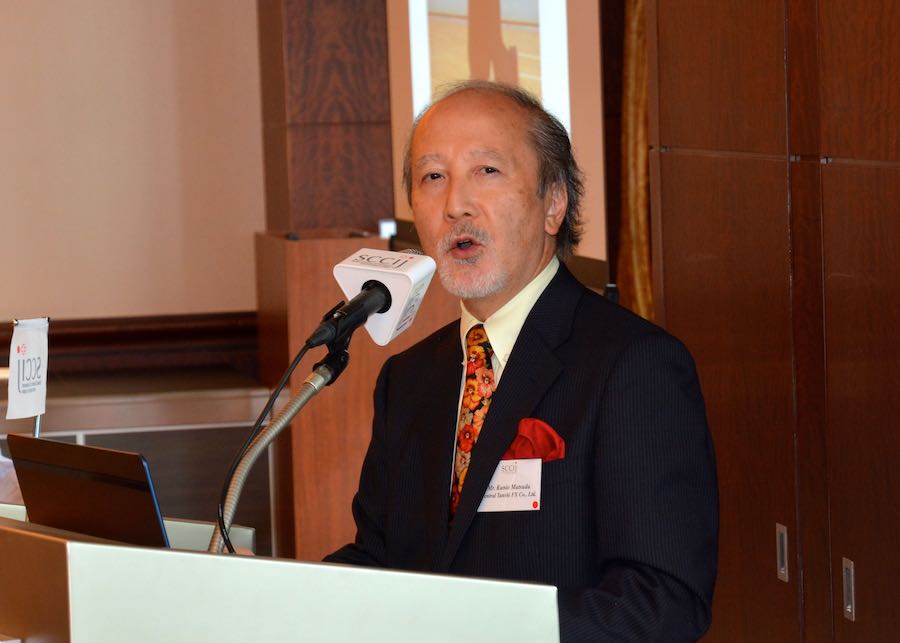Tokyo (SCCIJ) – Japanese retail investors in the forex market like margin trading with Swiss francs but the share of the currency is not as large as other European currencies such as Euro and British pound, speaker Mr. Kunio Matsuda told about 40 members and guests of the SCCIJ at the September luncheon. Also, the President of Central Tanshi FX explained how the world-famous retail investor called “Mrs. Watanabe” influences the forex market.

September luncheon speaker Mr. Kunio Matsuda, President of Central Tanshi FX
Drastic expansion of FX in Japan
At the start, the luncheon speaker had a story with a personal twist to tell. It was about the merits of the career system at the Bank of Japan which hires an annual cohort of employees, and advises the whole group to retire when they reach the age of 55. “All employees abide by this unwritten rule, nobody sues the bank for age discrimination,” he told the audience. After his retirement, Mr. Matsuda joined Central Tanshi FX, one of the leading over-the-counter broker houses for foreign exchange. More than 95% of its clients are small individuals, only 5% are companies, and hardly any of them are institutional investors.
Then, the speaker turned to his main subject: “FX has developed over the last 20 years into the most popular investment instrument for individuals,” he stated. The Japanese forex margin trade market would be the largest in the world, ahead of the U.S., U.K., Indonesia, Australia, and China. The transaction volume increased in particular between 2010 and 2014 when the Bank of Japan started its largest quantitative easing program ever. This move caused a major depreciation of the yen which opened up big chances to earn money on margin trades. “The higher the volatility, the bigger is the turnover in trades,” Mr. Matsuda said.

Members and advisors of the SCCIJ Executive Board at the September luncheon
Mrs. Watanabe’s investment style
“Why are the Japanese so much interested in the exchange rate? Well, like in Switzerland, the exchange rate has had repeatedly a substantial effect on the economy,” Mr. Matsuda argued. A particular type of retail investor is traditionally called “Ms. Watanabe.” The speaker characterized this non-professional trader as a housewife with some assets to invest and sufficient free time to speculate: “We have many clients with such properties.” His interesting explanation for the name: “In all 36 Zaimukan, Vice Ministers of Finance for International Affairs, in the history of Japan, remarkably as many as four carried the name Watanabe.”
Ms. Watanabe and other forex retail investors behave uniquely: Whereas professional traders follow the market momentum, individuals tend to trade against the current trend. They behave more like a hedge fund and act contrary to bank dealers. “The basic strategy is to buy dollar when the price looks close to the bottom,” he said. They avoid selling dollars first, because this means borrowing in dollar and paying a higher interest rate. As a result, the actions of Ms. Watanabe have much the same effect on the exchange rate as a yen-selling market intervention by the Japanese monetary authorities, but without the chance for foreign governments to accuse Japan’s Ministry of Finance of manipulation.

The SCCIJ September luncheon followed strict social distancing and mask wearing rules to minimize viral infections.
Popular trading strategy
What are the merits of retail forex trading? Mr. Matsuda named several reasons: First, costs are low compared to foreign currency deposits. Second, there is a rich variation of about two dozen currency pairs. “However, the share of the Swiss franc is small because historically, the low-interest rate like Japanese Yen or Swiss franc has made this currency less interesting for a carry trade,” the speaker explained. Also, many traders are still reeling under the memory of the Swiss franc shock in 2015 when the Swiss National Bank suddenly let the Swiss franc float freely instead of fixing it to the Euro.
The third reason for the popularity of FX: You can start trading by selling first. Fourth, you can trade 24 hours a day, even from your smartphone. Fifth, compared to stocks and bonds, forex is a very liquid and transparent market with no leeway for insider trading. Finally, traders can leverage their investment up to 25 times the principal. “You may then win big or lose big, even by small market fluctuation, but we advise our clients to take less risk,” he said. On average, their leverage comes to 4 to 5 times of principal.
Biography of the Speaker
Mr. Kunio Matsuda studied law at Osaka University and worked for the Bank of Japan between 1980-2012. From 1984-85, he studied economics at the University of Saarland (Germany) under Prof. Wolfgang Stützel. From 1998-2001, he served as the chief representative of the bank’s Frankfurt office. At that time, the European Central Bank (ECB) and the Euro were introduced. For the first decade of the century, he held the roles of general manager of the bank’s Nagasaki branch and deputy general manager of the Osaka branch. Since 2013 he has served as the president of Central Tanshi FX, one of the leading OTC-FX business companies.
Text and photos: Martin Fritz for SCCIJ





























